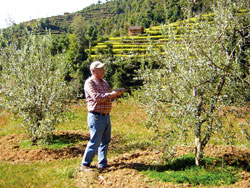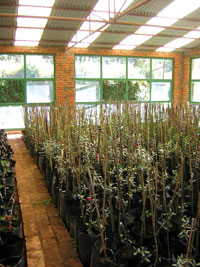
Hartmut Bauder, the visionary, German-born entrepreneur who started Nepal's first olive plantation, is on his way to his farm in Chitlang. His driver has had to give up the steering wheel and is now dozing off in the back seat.
"I love driving in Nepal, believe it or not, it's a lot safer than driving back home in Germany," he says with a cunning smile. "There are simply too many rules to follow there."
Bauder's love affair with Nepal and with olive trees started during his childhood in Provence, in southern France. Later, while working as a manager with the German chemical giant BASF in Bombay, he kept wondering why Indians did not grow olives despite the suitable climate.
He finally learned that a large Italian-led project was just being launched in Himachal Pradesh. Keen to follow the experiment close-up, he started visiting the site and talking to the experts on a regular basis.
|
|
His idea of going into early retirement and setting up a similar project in Nepal, his wife's country, was shaping up and gaining strength.
"The more you know about olive trees, the more you convince yourself that this looks like an ideal crop for Nepal: olives grow on very poor soil, they don't need water," Bauder explains.
When Nepali Times selected Bauder's Himalayan Plantations as its Company of the Month for March 2008, he was thrilled. The man has teutonic tenacity, but after 13 years even he was on the verge of dumping the project, mainly because of a pesky fungus that affects olive trees, the political uncertainty and of course, rife extortion.
When he set up Himalaya Plantations in 1995, Bauder was met with scepticism from those who maintained that olives require a Mediterranean climate to grow. Bauder remained unfazed. He imported the first trees and started growing them in a nursery. Then he selected the two five-hectare sites in Chitlang (named Tuscany and Vinci) for its microclimate and soil and also proximity to Kathmandu.
A committed Rotarian who is behind several charitable projects in Nepal, Bauder acknowledges that initially he did not really know whether Chitlang would prove to be suitable.
"A couple of Nepali friends have a few shares in the company. Maybe I should not tell them that I accepted the fact that I might never recover my money," he concedes. His real aim was not to make money, but rather to prove that olive oil could be produced in Nepal.
Indeed, Himalaya Plantations' oil has been found not only to be extra virgin, but of excellent quality for taste and other parameters by the International Olive Oil Council's testing labs in Australia, Italy and Germany.
|
|
The precious oil is already sold long before it is bottled, and is considered a real treat by whoever has tasted it. Its uniqueness makes it an exclusive gift: an Italian who owns a travel agency in Kathmandu presents his top customers with a bottle, while a Chinese lady sells a few litres at auction in Hong Kong to raise money for a monastery.
"We are selling our oil here at Rs 2,000 per litre, which even by European standards is a fantastic price, but production is very limited," Bauder explains.
Although the 2,000 trees on the two plots grow strong and healthy, a fungus is forcing Himalayan to harvest olives ahead of time, thus limiting oil production to 150 litres a year, far too little to make a profit.
Himalayan Plantations is collaborating with the Horticulture Department as well as the Agriculture Research Council to try to control the fungus. Bauder hopes Nepali farmers will start buying a few trees to start their own oil production for personal use. He believes olive oil can dramatically improve the diet of poor people even if it is produced on a very small scale.
For now, neighbouring farmers in Chitlang are sitting on the fence and watching. They have seen how hard Bauder and his farm hands have worked to grow healthy olives, and wonder why someone should bother so much about those small, hard and bitter green fruits that look pretty much like fodder.
It's time for Bauder to head back to Kathmandu, and this time he lets his driver drive to take in the spectacular scenery on the Tribhuban Highway.
www.himalaya-plantations.com
Previous Company of the month:
November 2007
December 2007
January 2008




